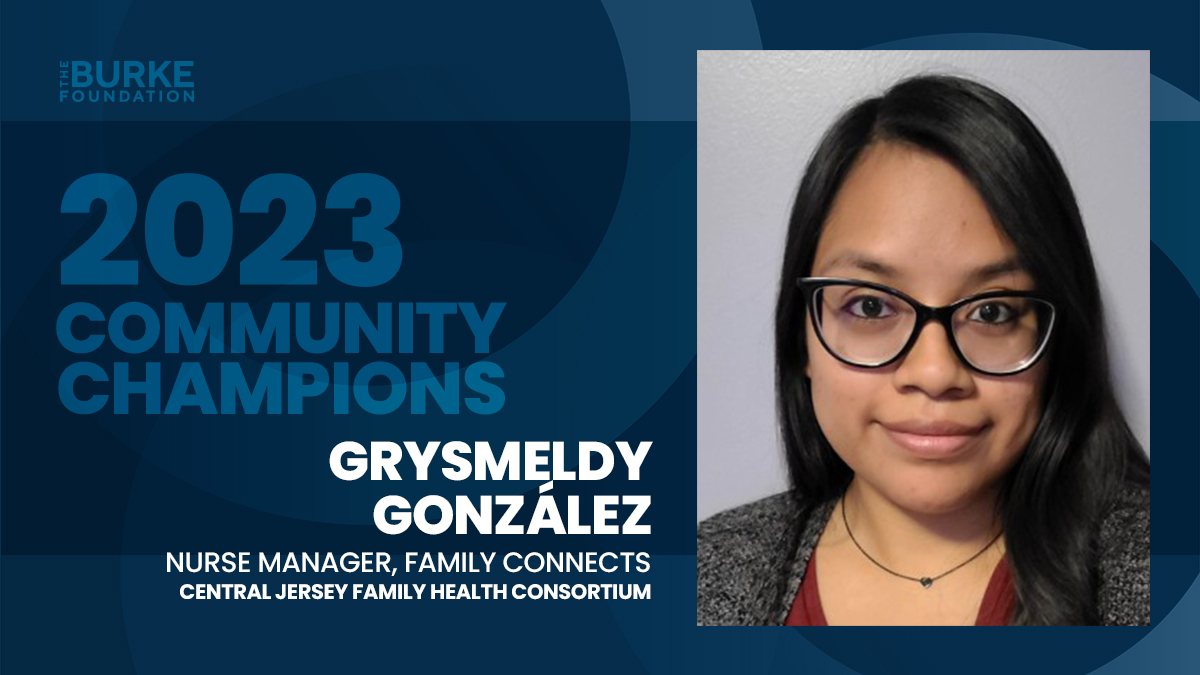“We’re all part of the same greater ecosystem, so true partnership and collaboration is the only way to bring about change.”
– Grysmeldy González, Nurse Manager, Family Connects
Interview with 2023 Community Champion Grysmeldy González
Grysmeldy González was recognized by the Burke Foundation as a 2023 Community Champion for her leadership in helping build New Jersey’s first universal home-visiting site. She believes in the power of connecting with families in the earliest weeks as a way of building a solid foundation for family bonding.

2023 Community Champion: Grysmeldy González, Nurse Manager, Family Connects
What accomplishment makes you most proud?
I was one of the first nurses hired for the Universal Nurse Visit program pilot at the end of 2021, and it was truly a riveting experience to help launch the program from the ground up. I‘m very proud of all the work the nurses and the other individuals and partners involved have done to make this possible.
As a team, our biggest accomplishment has been completing 1,000 visits, which we hit last month! Starting a pilot is very challenging, because it requires a flexible team that’s able to continuously tweak and make changes to improve the program.
I consider managing Family Connects to be my biggest accomplishment. As a nurse, I’ve always chosen to work with minority and disadvantaged groups, mainly in Middlesex and Mercer counties. I grew up in New Brunswick, the daughter of immigrants, and I experienced many of the same issues our current clients deal with. I’m a firm believer that prevention and systemic change are the only ways to better the health of entire populations, which is what we, at Family Connects, aim to do.
At the Burke Foundation, we focus on supporting families during the first 1000 days from pregnancy through age two — what do you see as the biggest challenge for families during that time period? How do you address that challenge?
One of the biggest challenges for families during the first 1,000 days is lack of support — from people close to them as well as from society as a whole. We live in a time when parents and families are stretched thin due to the demands of society and our present socio-economic status. The stressors from life, work, and family, and the financial pressure on families can greatly affect the bonds created among family members. Parents go back to work too soon; many immigrants have very little family here; and all this can limit parents’ ability to bond with each other, with their newborn, and with other family members.
We address this by trying to strengthen bonds from the beginning by encouraging all caregivers to join our visits, assessing how family members interact with the newborn, and providing education on how to bond with baby to help them learn, grow, and play. We also connect families to long-term home visiting programs or case management if they need a lot of extra support. Many of these programs stay with families for years and serve as that support system some families are missing.
What gives you hope in what you are seeing in the early childhood / maternal health space?
Something I’ve been increasingly noticing that gives me hope is an interest in investigating the role of racism and how it affects provider interactions with BIPOC families and, in turn, how it affects health. There’s a lot of work being done to address the startlingly disproportionate rates of Black fetal/newborn/maternal morbidity and mortality. I‘ve seen a study out of Rutgers investigating BIPOC experiences in OB/GYN spaces relating to culturally competent and respectful care. This is important to me because I’ve experienced the effects of prejudice in the healthcare setting and met many patients who have as well. The work I see being done in this field assures me that people are listening and wanting to make a change.
What is the secret to a great partnership — either with government, community or individuals?
The secret to a great partnership at any level is to consciously remove all biases we’ve developed about certain individuals, a community, etcetera, and truly make an effort to treat everyone the same. We’re all humans at the end of the day, and I don’t see myself as “better” or “above” any of the underprivileged families I see. We’re all part of the same greater ecosystem, so true partnership and collaboration is the only way to bring about change. Once you do this, rapport tends to be established naturally. It’s important to make an effort to continue to strengthen these partnerships, in the same way that any relationship requires maintenance to blossom.
